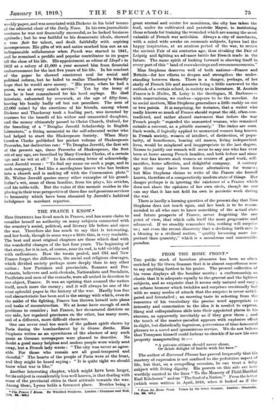THE FRANCE I KNOW.*
Miss Seem-ems has lived much in France, and has some claim to consider herself an authority on many subjects connected with the country's social, political, and literary life before and since the war. Therefore she has much to say that is interesting, and her book, though in some ways a little thin, is very readable. The best and most original chapters are those which deal with the wonderful changes of the last four years. The beginning of that story, for it is not, of course, near its end, is told vividly and with enthusiasm. How the Meant pealed, and Old and New France forgot the differences, the social and religious cleavages, which divided society perhaps more deeply than in any other nation how Parisians and provincials, Romans and Pro- testants, believers and anti-clericals, Nationalists and Socialists, Pacificists and men of the revanche, were all united in devotion to one object, France. It was an uprising that amazed the nation itself, much more the enemy ; and it will always be one of the most splendid pages in the history of the war. Hardly lees fine and oharaoteristio has been and is the energy with which, even in the midst of the fighting, France has thrown herself into plans and tasks of reconstruction. We at home have enough of such problems to consider ; but France, her devastated districts on one side, her regained provinces on the other, has many more, and of a different, more difficult character.
One can never read too much of the gallant spirit shown by Paris during the bombardment by to Gram Berthe. Miss Stephens writes as an eyewitness of the absence of any each panic as German newspapers were pleased to describe. No doubt a good many helpless and useless people were wisely sent away, but a French lady wrote " The city was never so agree- able. For those who remain are all good-tempered and cheerful" The hearts of the people of Paris were at the trout, and they might be heard saying " It is quite right we should knew what war is like."
Another interesting chapter, which might have been longer, for its subject is considerably less well known, is that dealing with some of the provincial cities in their attitude towards the war. Among these, 'Lyons holds a foremost place. Besides being a
f1• The Awe., Zoom Ihr Whateed Stepbens. London : Chapman and Hat Dn. M. +Masi
great arsenal and centre for munitions, the city has taken the lead, under its cultivated and patriotic Mayor, in instituting those schools for training the wounded which are among the most valuable of French war activities. Always a city of merchants, with a mind wide awake on economic subjects, Lyons had the happy inspiration, at an anxious period of the war, to revive the ancient Fair of six centuries ago, thug rivalling the Fair of Leipzig and fighting an advance battle for French trade in the future. The game spirit of looking forward is showing itself in every part of this " land of reawakeninge and recommencements."
Miss Stephens deserves well of both nations—France and Britain—for her efforts to deepen and strengthen the under. standing between them. There is a danger, perhaps, of her study of French life and manners being a little narrowed to the outlook of a certain school, in society as in literature. M. Anatole France is le Maitre, IL Loisy is the theologian, M. Barbusse- with reservations, we confess—appears to be the novelist. As to social matters, Miss Stephens generalizes a little rashly on one or two points. It is surprising, for instance, that a writer who really knows so much of France should repeat the old, often-con- tradicted, and rather absurd statement that before the war French people "regarded the unmarried woman, who remained outside a convent, as a pitiable anomaly." The italics are ours. Such words, if logically applied to unmarried women long known in French society, women of intellect, of distinction, of popu- larity, of beneficence, bearing old names, living independent lives, would be misplaced and inappropriate to the last degree. Names to justify our remark will occur to any one who tam ever been at home among French families, and both before and since the war has known such women as centres of ;mod work, self- sacrifice, home affection, and delightful company. A century ago there may have been fewer alternatives for women ; but Miss Stephens claims to write of the France she herself knows, therefore of a comparatively modern state of things. Her danger perhaps is in ignoring the existence of a France which does not share the opinions of her own circle, though no one can say that it has not held its own in patriotic work during the war.
There is hardly a burning question of the present day that Elise Stephens does not touch upon, and her book is to be rtr.om- mended to all who care to know something of the actual state and future prospects of France, never forgetting the one point of view, that which calls itself the most progressive and advanced. If we steadily remember this, nothing will surprise ue ; not even the recent discovery that a declining birth-rate is a blessing to a civilized nation, quality becoming more im- portant than quantity," which is a monstrous and unscientific paradox.


































 Previous page
Previous page